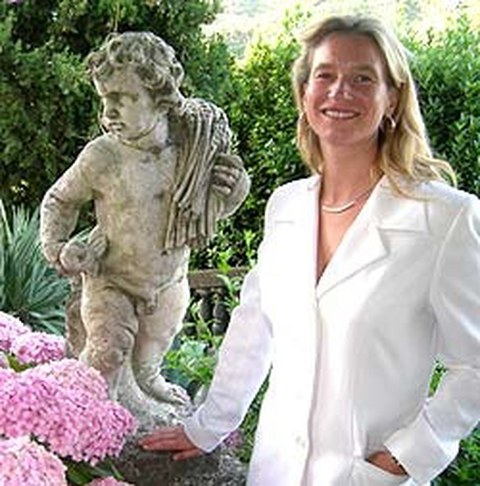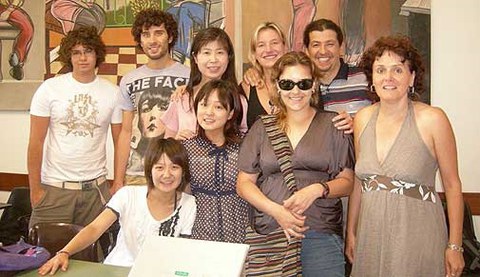A wanderer between two worlds: From the Florence of the Elbe – to Florence
(Interview from 2011 with 2020 update)
Dagmar Möbius/Susann Mayer
Katrin Wegener studied art education and German studies on the high school teacher training program. Erasmus took her to Florence, Italy. That's where she works today – as a promoter, art dealer and journalist. As a TUD regional ambassador, she helps students who want to go to Italy for an internship or semester abroad.
Lawyer or teacher? Comfort zone or unknown territory? When Katrin Wegener had to decide, she chose a place at TU Dresden. After graduating from high school with flying colors, she started an art education and German high school teacher training course in 1995. "Even in high school, I loved both subjects," says Katrin Wegener, who is from the outskirts of Berlin, "I imagined it would be exciting, and useful, to share my personal areas of interest, the joy I feel when learning and trying out artistic techniques with children and young people." She wanted to give them skills that would allow them to engage creatively with the reality of their lives. In short: creative problem-solving. Inspired by the film "Dead Poets Society," she chose German as her second subject out of a love of literature and writing. "Where language comes from and how it evolved is also something I wanted to explore," she explains. The appeal of discovering Dresden, a world-famous baroque city, was at the same time a challenge. "Berlin is not far from Dresden," she consoled herself. Fortunately, student life proved as good as she had hoped. "Campus parties and Bärenzwinger [a student club] is all I'm saying," she smiles.
The artistic techniques she learned on the art education program and how they were taught, help her a lot today, as does the insight she gained into Dresden's gallery scene. For five years, she worked as a student assistant, supervising, organizing and reviewing exhibitions. "Above all, it was always about understanding and building interpersonal relationships," she says. The Latinum Latin exam she took for her German studies course later helped her to learn Italian more quickly. "It was also helpful for a deeper understanding of the structure of language and is an advantage today when I sometimes teach German as a foreign language, despite the fact that I never studied that area."
In 2002, for an Erasmus place in Florence offered through the Faculty of Arts, Humanities and Social Science, Katrin Wegener was urgently looking for a four-week intensive Italian course. She found the Centro Machiavelli through an advert on a noticeboard. It was a stroke of luck. Today, she works there herself. The center offers not only Italian, but also art and Italian opera courses. "Again, the focus here is communication," says Katrin Wegener, who is happy in her adopted city. "We are more than a language school; the whole world really does come together here and people get to know each other." A solution to every problem is sought, for Italians and non-Italians alike. Katrin Wegener manages everything to do with German-speaking countries at Centro Machiavelli. She works with students, applies for educational leave in various German states, designs advertising flyers and presentations for education fairs, translates, creates concepts for alternative advertising opportunities, organizes business lunches and trips. "Modern jobs now require a varied skillset based on communication and networking," she says. "You need to find your way in that environment, and combine your contacts in a productive way." Then, she believes, you can find an interesting job that you like, even if it is not always exactly what you had originally imagined.
Katrin Wegener works in several different areas. For example, at the Italian art magazine Artein, she is responsible for presentation, public relations, and marketing. "I'm approached by artists, gallery owners and journalists with a wide variety of needs and problems. They expect me to handle them professionally." Her ability to write about art also enables her to collaborate with journalists. Her plan to organize art exhibitions on the basis of partnerships between Germany and Italy "is in progress." In her role as "Europe artist-finder" for an American art wholesaler, she acts as a broker between artists and gallery owners, conducting sales negotiations and handling contracts.
Katrin Wegener still has regular contact with TU Dresden, and is glad to keep in touch. She is especially grateful to Marie-Luise Lange, Adolf Böhlich, Roland Unger, Siegfried Sack and above all Petra Resch. When TUD students come to Venice on trips, she sometimes stands in as an interpreter.
As a TU Dresden regional ambassador, she can help students who want to go to Italy for an internship or semester abroad. Simply contact her at:
2020 update:
"In 2017, I married my Italian love, Gino Tozzetti (Dr. Torsten König from the TUD Institute of Romance Studies was at the wedding)," she tells us. "We have now been together for 18 years, love living between two worlds and have a wonderful daughter, aged five, who is completely at home in both languages and countries. A little European, so to speak.
I still love languages, writing, art and painting. In 2018, the time had finally come: My dream of bringing my two worlds together through art was fulfilled. Together with Angela Ehrlich from the Faculty of Arts, Humanities and Social Science, I succeeded in organizing a painting exhibition entitled 'Zwei Flüsse – Zwei Strömungen' ['Two Rivers - Two Currents'] at Dresden City Hall to mark the 40th anniversary of the twinning of Dresden and Florence. The two cities, the TU Dresden Center for Italian Studies (Prof. Maria Lieber), teachers from the art education department (Dr. Petra Resch and Prof. Roland Unger), and the Italian art association Colori del Levante Fiorentino and three of its artists (Mauro Mannelli, Annalisa Bati and Patrizia Fabbri) all played a major part in the project. We are working on a 50th anniversary event."
Contact:
Email


